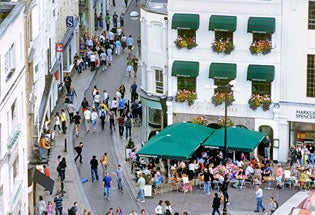Cambridge beats Exeter for title as UK's ultimate 'clone town'

Your support helps us to tell the story
From reproductive rights to climate change to Big Tech, The Independent is on the ground when the story is developing. Whether it's investigating the financials of Elon Musk's pro-Trump PAC or producing our latest documentary, 'The A Word', which shines a light on the American women fighting for reproductive rights, we know how important it is to parse out the facts from the messaging.
At such a critical moment in US history, we need reporters on the ground. Your donation allows us to keep sending journalists to speak to both sides of the story.
The Independent is trusted by Americans across the entire political spectrum. And unlike many other quality news outlets, we choose not to lock Americans out of our reporting and analysis with paywalls. We believe quality journalism should be available to everyone, paid for by those who can afford it.
Your support makes all the difference.So the Starbucks culture has infected the groves of academe. Cambridge, university city of ancient colleges, spires and towers, of hidden gardens and river vistas, is betrayed by its high street shops, a new report claims.
Their lack of variety, and their domination by big chains, make Cambridge Britain's top "clone town", says the New Economics Foundation.
Five years ago the foundation came up with the concept of clone towns – urban areas which had lost their identity as global and national chain stores drove out local businesses. In a national survey in 2005, Exeter was highlighted as the worst offender, with allegedly the blandest high street in Britain.
But in an eyebrow-raising verdict in a repeat of the survey, published today, Cambridge, one of the UK's best-loved cities and top tourist attractions, takes top spot. "While Cambridge University celebrates eight centuries of academic excellence and intellectual diversity, a bland homogeneity and encroaching vacant premises characterise the city's shopping centre," says the new report, entitled "Re-imagining the High Street".
It goes on: "Diversity is a stranger in Cambridge's clone zone; our pollsters counted a meagre nine varieties of shop (the lowest diversity of all 128 of our surveys) with 25 of the 57 surveyed being clothing multiples."
A spokesman for Nef, Paul Hurst, said: "Cambridge is full of wonderful buildings and I've no doubt, wonderful people, but the actual shops don't reflect the diversity you will find in Cambridge as a town. Tourism is a factor in this – it is leaning more towards the international tourist market. But what are the tourists going there for – the sort of shops they will find in Heathrow Terminal Four? This is a warning that local diversity needs to be actively maintained and supported and won't necessarily survive on its own."
But the report was immediately blasted as "nonsense" by Cambridge's head of tourism and city centre management, Emma Thornton. "It is quite apparent that the authors have either not visited Cambridge at all, or did not spend very long here," she said. "Any serious shopper knows that what sets Cambridge apart as a shopping destination is the fantastic diversity of shops, many of which are independent retailers and real gems .To label Cambridge a clone town is pure nonsense." She added: "I will certainly be following this up with the report authors."
The report claims that 41 per cent of UK towns are clone towns – where more than half the shops and stores are chains. It says that Richmond has the most cloned high street of London's "villages" with only five independent shops. The opposite of clone towns are "home towns" and the best performing one in the survey was Whitstable, Kent.
Join our commenting forum
Join thought-provoking conversations, follow other Independent readers and see their replies
Comments